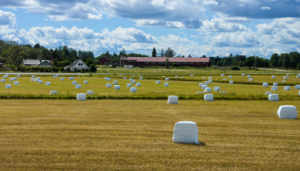Many hay producers utilize net wrap to keep hay bales together when stored outdoors. It helps prevent water shedding and better maintains the hay’s shape than twine’s.
Though wrapping may add a few dollars to the cost of baling, it is an investment worth making when considering savings in hay storage and dry matter losses compared to twine.
Stronger
 When selecting a bale wrapping product, producers should consider its strength and durability. A strong, resilient net wrap can handle intense pressure from the baler and dense crops or explosive loads. Furthermore, it provides an effective oxygen barrier, making the bale less likely to spoil during storage.
When selecting a bale wrapping product, producers should consider its strength and durability. A strong, resilient net wrap can handle intense pressure from the baler and dense crops or explosive loads. Furthermore, it provides an effective oxygen barrier, making the bale less likely to spoil during storage.
Bale wrap strength is determined by several factors, such as raw material and manufacturing processes. Some manufacturers use a higher-specification polymer for HDPE in their products, which will increase the strength of the final net.
Another factor affecting netwrap’s strength is how it is produced. Traditional netwrap is composed of wide film wound onto large mother rolls’ and then cut into tapes that are knitted together on knitting looms to form a net mesh.
The coloured thread used at the sides of tapes comes from a different source than the rest, so it must be introduced into the loom differently. It can cause issues during production and result in uneven winding on the edges of the net.
Some companies utilize a different coloured thread for their net wrap Adelaide, yet it must still be introduced to the loom identically. Doing this may cause the coloured strands to be over-tensioned compared to other strands, leading to uneven winding on the edges.
A stronger net wrap will produce a tighter bale with improved shape and structure. It can enhance the visual appeal of hay producers who market their bales.
The net wrap also helps reduce dry matter losses during outdoor storage, one of the biggest problems farmers face. This loss occurs due to plant respiration, microbial activity and weathering due to the water-repellency of net wrap compared to twine, which allows more dry matter storage space per unit area. Therefore, producers can save money on outdoor storage costs by reducing the number of bales required for storage.
Durable
Net wrap is a robust product designed to withstand heavy machinery handling and weather elements. It reduces storage loss and minimizes water shed from hay bales – making it an economical solution for many farming operations.
The net can also be used as a bale wrap, providing additional protection from wind, rain and sun. It could even double as a silage wrap to shield hay from vermin and weeds.
This durable net wrap method is ideal for agricultural applications where large quantities of hay and straw must be stored over an extended period. It can withstand the weight of heavy machinery like pick-up trucks when transporting rolled bales.
Net wrap is not only durable, but it’s easier to handle than twine. It is less likely to break or unravel during transport, decreasing the hay loss and damage risk. Furthermore, it prevents weeds from growing beneath bales – leading to costly repairs. Furthermore, net wrap keeps hay stable, which reduces brittleness and mould growth. Furthermore, it retains its shape over extended storage times with ease.
Easy to handle
Net wrap is much simpler to handle than twine, as it’s much easier to maneuver and can be removed for disposal. Furthermore, the net wrap has more versatility; it can be used on various bale types, such as hay or straw.
Net Wrap is also more durable than twine, as it doesn’t tear as easily and can handle a wider range of conditions. It is ideal for farmers who want to maximize production while decreasing costs.
The net wrap has the unique advantage of helping producers create tighter and denser bales, improving water-shedding capabilities and protecting against hay loss during storage.
Many farms also utilize net wrap to make bales of animal feed, such as hay or straw. Many farmers prefer net wrap since it is more durable than twine.
